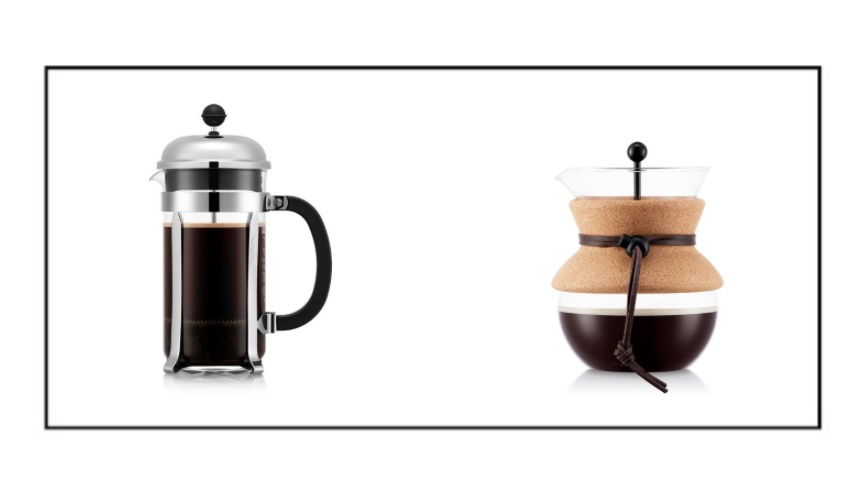
In the world of coffee brewing, two methods stand out for their popularity and the unique flavors they bring to your cup: pour over and French press. These methods have garnered a dedicated following among coffee enthusiasts worldwide, each offering a distinct approach to coffee brewing that affects everything from texture to taste.
Key Takeaways
- Differences in Flavor: Pour over coffee is celebrated for its cleaner, more nuanced cup. It’s known for accentuating a coffee’s brighter, more delicate flavors, making it a favorite among those who enjoy the subtler aspects of their brew. In contrast, the French press is synonymous with a rich, bold flavor profile. Its method allows the coffee’s natural oils and fuller body to shine through, delivering a robust cup.
- Brewing Technique and Control: The pour over method offers aficionados a high degree of control over the brewing process. This precision enables a more refined extraction, allowing the subtle notes of the coffee to be explored. On the other hand, the French press is admired for its straightforwardness and ease of use. Though it offers less control over extraction, its simplicity makes it a beloved choice for many.
- Coffee Ground Size: The choice of coffee ground size is crucial in each method. Pour over requires a medium-coarse grind, aiming for a balanced extraction that prevents the coffee from becoming bitter. The French press, however, works best with a coarse grind, ensuring the coffee steeps properly without passing through the mesh filter.
- Maintenance and Cleaning: Regarding upkeep, the French press demands a bit more effort due to its design. The need to dismantle and clean each part can be a bit tedious. Pour over equipment, conversely, typically requires less maintenance, making it a simpler option for day-to-day use.
- Caffeine Content: Interestingly, pour over coffee often contains a slightly higher caffeine content than its French press counterpart. This difference can be attributed to the grind size and the extraction process, offering a bit of a stronger kick for those who need it.
Pour Over Coffee
Pour over coffee brewing is a testament to the art and precision that goes into making a great cup of coffee. It’s not just about pouring hot water over ground coffee; it’s a ritual that rewards you with a cup that’s rich in flavor and aroma. This method, beloved by coffee aficionados and beginners alike, offers a hands-on approach to coffee that puts you in control of every variable.
Advantages and Disadvantages
Advantages:
- Control and Precision: The pour over method gives you control over every aspect of the brewing process, from water temperature to flow rate, allowing for a more precise extraction of flavors.
- Clarity of Flavor: This method typically produces a clean and complex cup of coffee, highlighting the unique characteristics of the coffee bean.
- Simplicity and Accessibility: Despite its detailed process, pour over brewing is relatively straightforward, requiring minimal equipment.
Disadvantages:
- Time and Attention: It demands more time and attention than other brewing methods. Each cup requires manual pouring and constant attention.
- Consistency: Achieving consistency can be challenging without practice, as slight variations in technique can alter the taste.
Ideal Situations for Pour Over Coffee Brewing
Pour over coffee shines in moments where you have the time to savor the brewing process and appreciate the nuanced flavors of your coffee. It’s perfect for a quiet morning, a mindful break in your day, or when entertaining friends who appreciate a meticulously brewed cup.
Key Factors for Brewing Perfect Pour Over Coffee
To elevate your pour over game, consider these critical factors:
- Grind Size: The grind size should be medium-coarse, similar to sea salt. Too fine, and you risk over-extraction and bitterness; too coarse, and your coffee might taste weak.
- Water Temperature: Ideal water temperature is between 195°F to 205°F. Water that’s too hot will extract undesirable flavors, while water that’s too cool won’t extract enough, leading to a flat taste.
- Pouring Technique: Start with a small amount of water to “bloom” the coffee, releasing gas and ensuring even saturation. Then, pour slowly in a circular motion, maintaining a consistent flow and evenly extracting the coffee.
French Press Coffee
The French press method is a beloved classic in the coffee world, known for its simplicity and the rich, full-flavored coffee it produces. This method involves steeping coarse coffee grounds in hot water and then pressing down with a plunger to separate the grounds from the liquid. It’s a straightforward process that has been charming coffee lovers for decades with its robust results.
Advantages and Disadvantages
Advantages:
- Rich Flavor and Body: The French press allows coffee oils and fine particles to remain in the cup, contributing to a richer flavor and fuller body.
- Simplicity: With minimal equipment needed and no paper filters, the French press is simple to use and easy to master.
- Versatility: You can adjust the strength of your coffee easily by changing the amount of coffee grounds or steeping time.
Disadvantages:
- Sediment: Some might find the small amount of sediment that can end up in the cup off-putting.
- Temperature Control: Without the means to maintain water temperature, the brewing process can be less consistent than methods that brew under controlled conditions.
Ideal Situations for French Press Coffee Brewing
The French press is perfect for lazy mornings, camping trips, or any situation where you want to enjoy a rich, flavorful cup of coffee without much fuss. It’s also ideal for sharing, as most French press pots can serve multiple people.
Key Factors for Brewing Perfect French Press Coffee
Brewing the perfect cup with a French press is all about mastering a few key factors:
- Grind Size: The grind should be coarse, about the size of breadcrumbs. Too fine, and you’ll find your coffee bitter and your press hard to plunge.
- Steeping Time: Four minutes is the golden rule for steeping time. This allows for full flavor extraction without over-extraction, which can lead to bitterness.
- Plunging Technique: The plunge should be slow and steady. Pushing down too fast can agitate the grounds and lead to more sediment in your cup as well as a bitter taste.
FAQ
Is Pour Over Easier Than French Press?
Ease of use can be subjective. Pour over requires attention to detail, precision in pouring, and a bit more equipment. French press is simpler and requires fewer steps—add coffee, pour water, wait, and plunge. If you’re looking for straightforward and quick, French press might be easier.
Is A French Press Unhealthy?
No brewing method is inherently unhealthy, but it’s worth noting that French press coffee contains more oils and diterpenes, which have been linked to higher cholesterol levels. However, for most healthy adults, this isn’t a significant concern. Enjoying coffee in moderation is key.
Why Is Pour Over Coffee Good?
Pour over coffee excels in clarity and flavor. It allows for precise control over brewing variables, resulting in a cup that highlights the coffee’s subtle notes. The filter also catches more oils and fines, creating a cleaner taste.
Can You Add Milk To Pour Over Coffee?
Absolutely! While pour over coffee is often enjoyed black to appreciate its nuanced flavors, adding milk or any preferred add-in is entirely up to your taste preferences.
Why Is My Pour Over Coffee Weak?
Weak pour over coffee could be due to a few factors: the water temperature might be too low, the grind too coarse, or the pouring technique might need adjustment. Ensure you’re using the right grind size and fully saturating the grounds.
Final Thoughts
Pour over and French press coffee brewing methods cater to different tastes and preferences. The pour over method is all about precision and clarity of flavor, ideal for those who enjoy the ritual of brewing and the clean, nuanced profiles of their coffee. The French press offers a robust and straightforward brewing process, producing a rich, full-bodied cup.
Both methods have their unique qualities and appeal to different coffee drinkers. There’s no right or wrong choice, only what suits your taste, lifestyle, and how much time you’re willing to invest in your morning cup.









